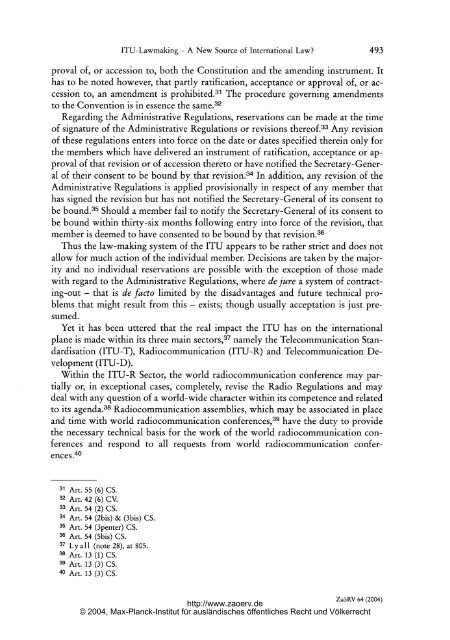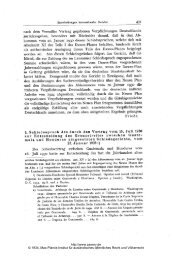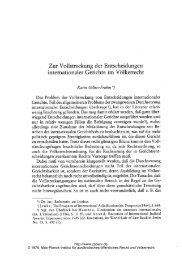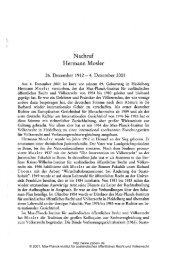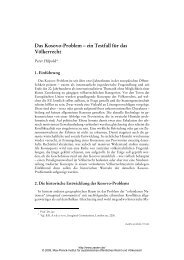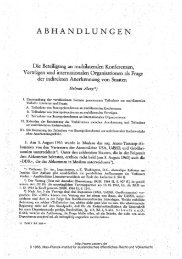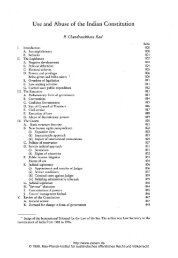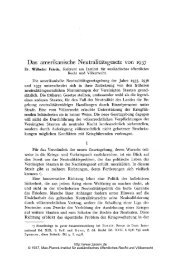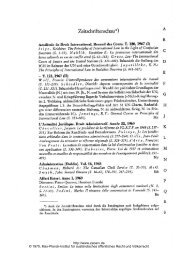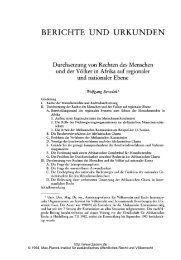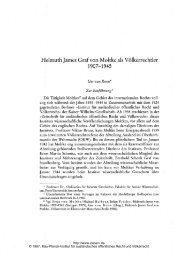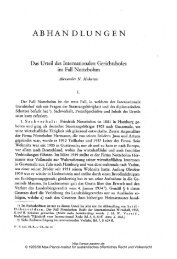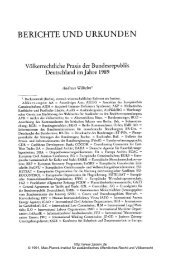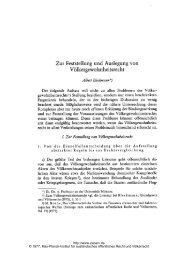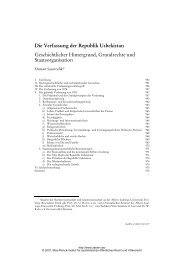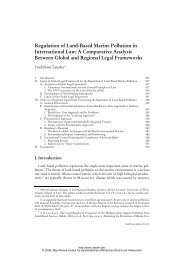The Law-Making of the International Telecommunication Union (ITU ...
The Law-Making of the International Telecommunication Union (ITU ...
The Law-Making of the International Telecommunication Union (ITU ...
Create successful ePaper yourself
Turn your PDF publications into a flip-book with our unique Google optimized e-Paper software.
- <strong>ITU</strong>-<strong>Law</strong>making A New Source <strong>of</strong> <strong>International</strong> <strong>Law</strong>? 493<br />
proval <strong>of</strong>, or accession to, both <strong>the</strong> Constitution and <strong>the</strong> amending instrument. It<br />
has to be noted however, that partly ratification, acceptance or approval <strong>of</strong>, or ac-<br />
cession to, an amendment is prohlbited 1 .31 <strong>The</strong> procedure governing 1 amendments<br />
32<br />
to <strong>the</strong> Convention is in essence <strong>the</strong> same.<br />
Regarding <strong>the</strong> Administrative Regulations, reservations can be made at <strong>the</strong> time<br />
<strong>of</strong> signature <strong>of</strong> <strong>the</strong> Administrative Regulations or revisions <strong>the</strong>re<strong>of</strong>.33 Any revision<br />
<strong>of</strong> <strong>the</strong>se regulations enters into force on <strong>the</strong> date or dates specified <strong>the</strong>rein only for<br />
<strong>the</strong> members which have delivered an instrument <strong>of</strong> ratification, acceptance or approval<br />
<strong>of</strong> that revision or <strong>of</strong> accession <strong>the</strong>reto or have notified <strong>the</strong> Secretary-General<br />
<strong>of</strong> <strong>the</strong>ir 34<br />
consent to be bound by that revision. In addition, any revision <strong>of</strong> <strong>the</strong><br />
Administrative Regulations is applied provisionally in respect <strong>of</strong> any<br />
member that<br />
has signed <strong>the</strong> revision but has not notified <strong>the</strong> Secretary-General <strong>of</strong> its consent to<br />
be bound.35 Should a member fail to notify <strong>the</strong> Secretary-General <strong>of</strong> its consent to<br />
be bound within thirty-six months following entry into force <strong>of</strong> <strong>the</strong> revision, that<br />
member is deemed to have consented to be bound by<br />
that revision.<br />
Thus <strong>the</strong> law-making system <strong>of</strong> <strong>the</strong> <strong>ITU</strong> appears to be ra<strong>the</strong>r strict and does not<br />
allow for much action <strong>of</strong> <strong>the</strong> individual member. Decisions are taken by <strong>the</strong> major-<br />
ity and no individual reservations are possible with <strong>the</strong> exception<br />
with regard to <strong>the</strong> Administrative Regulations, where de Jure a system <strong>of</strong> contract-<br />
- ing-out that<br />
- blems that might<br />
sumed.<br />
36<br />
<strong>of</strong> those made<br />
1s de facto limited by <strong>the</strong> disadvantages and future technical pro-<br />
result from this exists;<br />
though usually acceptation 1s just pre-<br />
Yet it has been uttered that <strong>the</strong> real impact <strong>the</strong> <strong>ITU</strong> has on <strong>the</strong> international<br />
plane is made within its three main sectors,37 namely <strong>the</strong> <strong>Telecommunication</strong> 1 Stan<br />
dardisation (<strong>ITU</strong>-T), Radlocommunication (<strong>ITU</strong>-R) and <strong>Telecommunication</strong> De-<br />
velopment (<strong>ITU</strong>-D).<br />
Within <strong>the</strong> <strong>ITU</strong>-R Sector, <strong>the</strong> world radlocommunication conference may par-<br />
tially or, in exceptional cases, completely, revise <strong>the</strong> Radio Regulations and may<br />
deal with any question <strong>of</strong> a world-wide character within its competence and related<br />
38<br />
to its agenda. Radlocommunication assemblies, which may be associated in place<br />
and time with world radiocommunication conferenceS,39 have <strong>the</strong> duty to provide<br />
<strong>the</strong> necessary technical basis for <strong>the</strong> work <strong>of</strong> <strong>the</strong> world radlocommunication con-<br />
ferences and respond to all requests from world radiocommunication confer-<br />
ences.40<br />
31 Art. 55 (6) CS.<br />
32 Art. 42 (6) CV.<br />
33 Art. 54 (2) CS.<br />
34 Art. 54 (2bis) & (3bis) CS.<br />
35 Art. 54 (3penter) CS.<br />
36 Art. 54 (5bis) CS.<br />
37 Lyall (note 28), at 805.<br />
38 Art. 13 (1) CS.<br />
39 Art. 13 (3) CS.<br />
40 Art. 13 (3) CS.<br />
ZaöRV 64 (2004)<br />
http://www.zaoerv.de<br />
© 2004, Max-Planck-Institut für ausländisches öffentliches Recht und Völkerrecht


